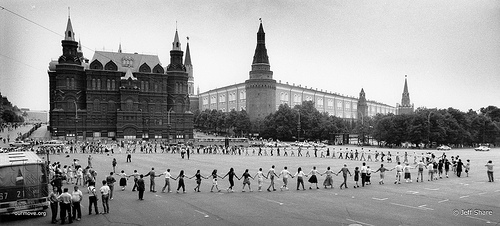We run our website the way we wished the whole internet worked: we provide high quality original content with no ads. We are funded solely by your direct support. Please consider supporting this project.
Does Nonviolence Work?
The teaching of Jesus on nonviolence strikes many as ludicrous, impractical, unpatriotic, irresponsible, and possibly even immoral. “Surely Jesus expects us to take up arms against Muslim extremists to protect our country and families!” If I had a dollar for every time I’ve heard something like that response, I’d be a fairly wealthy man.
The objection that the teaching on nonviolence is ludicrous, if not immoral, is nothing new. The nonviolent stance of the earliest Christians invited many of these same objections, as it has whenever Christians throughout history have embraced it.
The New Testament’s teaching on nonviolence strikes many of us this way because we are so conditioned by our violent culture that we have trouble imagining any other response to a life-threatening enemy. We are blinded by the pervasive, long-standing assumption that violence is both “normal” and “necessary” to promote good and minimize evil.
In reality, the belief that violence is “normal” and “necessary” is a self-fulfilling prophecy. It confirms itself by bringing about the very violence it expects and deems necessary. If the practice of refusing violence and loving enemies was consistently put into practice, we’d learn that, over the long haul (and with great sacrifice), the nonviolent way of Jesus is far more effective in combating evil than the way of violence. For while the way of violence may appear to curb evil in the short run, it always—always—produces more violence in the long run. It’s self-perpetuating.
But all of this is really beside the point, for Kingdom people are called to walk in obedience to the example and teaching of Jesus even when it seems to make no sense to do so.
We’re called to be faithful to Jesus, not effective at protecting our lives or ridding the world of evil.
To the world’s “normal” way of thinking, Jesus’ radical posture is indeed ludicrous, impractical, unpatriotic, irresponsible, and even immoral. And it may, in the short run, look like our refusal to participate in the merry-go-round of violence allows evil to win.
We need to remember that this is exactly how matters looked on Good Friday, when the omnipotent God suffered at the hands of evil rather than use coercive force to extinguish it. But under the reign of the sovereign God, Good Friday never has the last word.
Easter is coming.
Our call is to trust that the foolishness of self-sacrificial love will overcome evil in the end. Our call is to manifest the beauty of a Savior who loves indiscriminately while revolting against all hatred and violence. This is the humble mustard seed revolution that will in the end transform the world.
—adapted from Myth of a Christian Religion, pages 101-102
Category: General
Tags: Kingdom Living, Myth of a Christian Religion
Topics: Following Jesus
Related Reading

Little Pacifism
Richard Beck spoke about something he names Little Pacifism on his Experimental Theology website. It’s so easy, in the name of peacemaking, to become angry and aggressive. I suppose this is just part of what it means to be human. However, if we hope to bring the Kingdom of God closer the earth (and to…

homosexuality, truth telling, and love
A Guy Taking Pictures via Compfight A couple weeks ago, we posted a portion of Greg’s sermon (and his comments) on the marriage amendment in Minnesota, homosexuality and finding a “Third Way”. Today we’re continuing the conversation by linking to a blog post by Sarah Bessey called In which I tell you the truth about…

The “Kingdom Now”: Reflections on Magical American Christianity
One major problem American Christians face is that we tend to embrace a magical view of the Christian faith. We assume that if a person “prays the sinners prayer,” “surrenders their life to Christ,” and “accepts Jesus as Lord of their life,” this somehow magically “saves” them and will sooner or later magically transform them…

Put on the Armor of God
The whole of the Christian life is an act of war against the enemy as we follow Jesus in storming the gates of hell (See post.) No passage better illustrates this than Paul’s metaphor of spiritual armor from Ephesians 6. He writes that Christians are to “be strong in the Lord and in the strength…

How Judging Blocks Love
What keeps us from fulfilling the law of love that is exemplified by Jesus and laid out in the Scriptures (Matt. 22:39-40; Rom 13:8,10 Gal 5:14)? In a word, we like to pass verdicts. To some extent, we get our sense of worth from attaching worth or detracting worth from others, based on what we…

Be the Change Now
Ghandi once said, “Be the change you want to see in the world.” It’s a profoundly Kingdom teaching. It seems to me, however, that few people adopt Ghandi’s philosophy. It’s far easier to focus our attention on how others should change. It’s far easier to spend our energy assigning blame for the problems of society…

